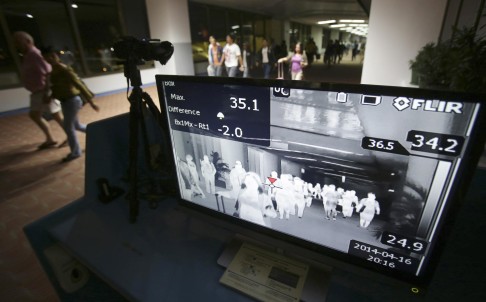Experts warn Mers virus may be mutating after sudden spurt in Saudi, UAE
Experts say infections in the Middle East may be an indication that the virus is mutating
PUBLISHED : Friday, 18 April, 2014, 10:17pm
UPDATED : Friday, 18 April, 2014, 10:17pm
Associated Press in Dubai

Passengers walk by a thermal scanner at Manila's airport. Photo: AP
A recent spate of infections from a frequently deadly Middle East virus is raising new worries about efforts to contain the illness, with infectious disease experts urging greater vigilance in combatting its spread.
More than 20 people, many of them health care workers, have been reported infected with the Middle East respiratory syndrome (Mers) coronavirus in two distinct clusters - one in Saudi Arabia and the United Arab Emirates - likely involving human-to-human transmission since early last week.
The disease, originally identified in 2012 in the Middle East, has also for the first time spread to Southeast Asia, a decade after the outbreak of the related Severe acute respiratory syndrome (Sars) virus.
"The last two weeks have put us into uncharted territory," said Michael Osterholm, an infectious disease expert at the University of Minnesota.
He described the recent batches of Saudi and UAE infections as "very important" and a possible signal that the virus could be mutating.
The disease's spread to Southeast Asia - confined for now to people with clear links to the Middle East - meanwhile "heightens the concern that we could be in the early days of another Sars-like event", he warned.
"We're clearly at a very significant 'stay tuned' moment," Osterholm said.
Middle East respiratory syndrome belongs to a family of viruses known as coronaviruses that include both the common cold and Sars, or severe acute respiratory syndrome, which was centred on southern China and Hong Kong and killed some 800 people worldwide in 2003.
Mers can cause symptoms such as fever, breathing problems, pneumonia and kidney failure. It does not for now appear to spread as quickly between people as Sars did.
But it does seem to be more deadly. According to the World Health Organisation, 92 of the 238 people confirmed to have been infected with Mers have died. A Malaysian man this week became the first person to die from the Mers in Asia. The 54-year-old from southern Johor state, near Singapore, developed a high fever and cough and had difficulty breathing after returning from a pilgrimage in Saudi Arabia on March 29.
It is also unclear how readily the virus can pass between people, though that appears to have happened in the Saudi and UAE infections.
"It is always a worry if sustained human-to-human transmission of a newly identified virus occurs," said Ian Mackay, a virologist affiliated with the Australian Infectious Diseases Research Centre at the University of Queensland.
Saudi health authorities last week reported that 11 people in the Red Sea city of Jeddah were infected. The United Arab Emirates separately reported infections among 10 health care workers linked to a Filipino paramedic who died in the country on April 10. Most were hospitalised with no symptoms or mild illness. One showed signs of pneumonia.
